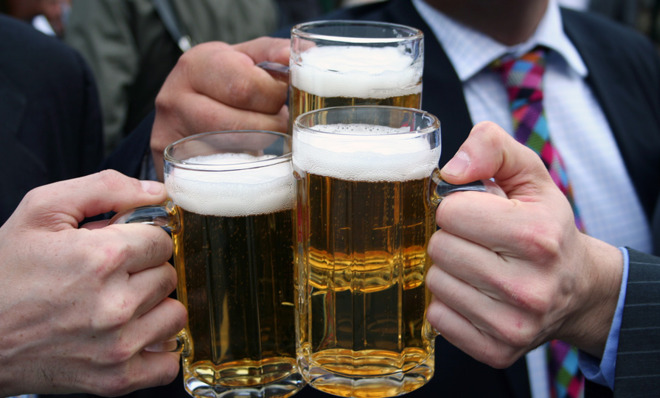Don Draper would be appalled: Why fake vices are on the rise
More people are opting for an e-cig and a can of O'Doul's

A free daily email with the biggest news stories of the day – and the best features from TheWeek.com
You are now subscribed
Your newsletter sign-up was successful
Don Draper would be appalled with where the world is headed these days.
Sales of both alcohol and cigarettes are falling throughout much of the world, while sales of e-cigs and non-alcoholic beer are on the rise.
As cigarette smoking has fallen (particularly teen smoking in the developed world), e-cigs, those battery-powered nicotine vaporizers you see people puffing indoors, are expected to double in sales to $2 billion this year. Big Tobacco, like Reynolds and Altria (Marlboro's parent company), are developing e-cigarettes and buying small brands to grab a wave on the changing tide.
The Week
Escape your echo chamber. Get the facts behind the news, plus analysis from multiple perspectives.

Sign up for The Week's Free Newsletters
From our morning news briefing to a weekly Good News Newsletter, get the best of The Week delivered directly to your inbox.
From our morning news briefing to a weekly Good News Newsletter, get the best of The Week delivered directly to your inbox.
At the cusp of the trend: Young people. Use of e-cigs has doubled for sixth through 12th graders, says a recent report by the Centers for Disease Control and Prevention.
At the same time, teetotaling is becoming increasingly popular amongst the younger generation. In the U.K. in 2003, 70 percent of 16- to 24-year-olds said they had a drink in the previous week. In 2010, the number was down to 48 percent. In the U.S., meanwhile, the percent of students who have consumed alcohol in all timeframes — from "ever" to "daily" — has plummeted between 1980 and 2010.
And as with e-cigs, sales of non-alcoholic beer are rising — some 80 percent internationally, says the Economist. And though sales are strong in the Middle East, where boozing is frowned upon and in some cases illegal, it's by no means the only factor. In Spain, sales of non-alcoholic beer are outpacing the Middle East, points out John McDuling Quartz.
Naturally, the trends vary around the world. Russia and the U.S., for instance, are still drinking heavily (U-S-A!), and smoking is still on the rise in parts of the developing world.
A free daily email with the biggest news stories of the day – and the best features from TheWeek.com
But it's an odd trend nonetheless. Why are large parts of the world cutting back on beloved vices, while amping up on fake vices at the same time? McDuling has an idea for Spain:
The social culture in Spain, where consuming alcohol may have more to do with mingling than getting drunk, is another possible driver. Spain’s aversion to alcohol could also tie into health fads; the Spanish are forking over more cash for organic and health foods despite the country’s worsening economy. [Quartz]
The Economist agrees that health awareness efforts are on the rise, and governments, including Britain's, have "chivvied the drinks industry into promoting low-alcohol alternatives."
"In Japan an ageing population, mindful of its health but fond of a tipple, has started to take up non-alcoholic beer. And better technology means that it is tastier than before," writes The Economist.
Health campaigns and government support are a factor with cigarettes as well (though, as McDuling points out, Spaniards are loath to give up their smokes). Research shows that both tax hikes and health advertisements, particularly those with graphic images of smoke-related illness, encourage smokers to quit.
In Vice, Alison Stevenson floated another suggestion for the decline of alcohol consumption. "We are in the golden age of the internet, and it's our love of being online that leads to our diminished interest in drinking," she writes.
We often consume alcohol in social situations... But now, we rely on the mask that is social media to make us feel cool and calm. We can have a charming conversation in the privacy of our own bedroom, wearing the cow print pajamas grandma got us for our birthday and still feel confident enough to ask someone on Facebook chat, "what are you wearing?" hoping that they don't answer, "cow print pajamas". [Vice]
Carmel Lobello is the business editor at TheWeek.com. Previously, she was an editor at DeathandTaxesMag.com.
-
 6 of the world’s most accessible destinations
6 of the world’s most accessible destinationsThe Week Recommends Experience all of Berlin, Singapore and Sydney
-
 How the FCC’s ‘equal time’ rule works
How the FCC’s ‘equal time’ rule worksIn the Spotlight The law is at the heart of the Colbert-CBS conflict
-
 What is the endgame in the DHS shutdown?
What is the endgame in the DHS shutdown?Today’s Big Question Democrats want to rein in ICE’s immigration crackdown